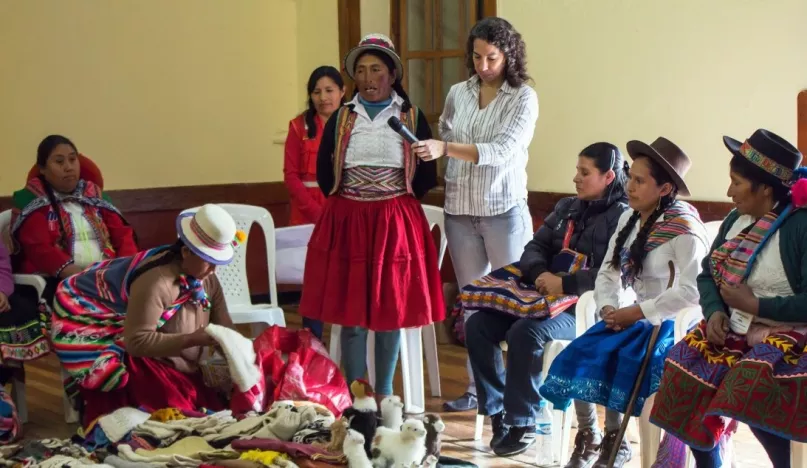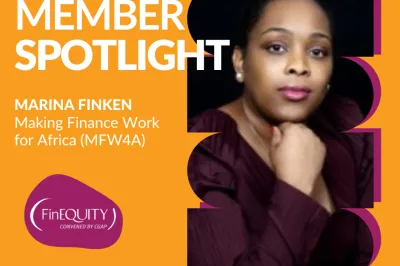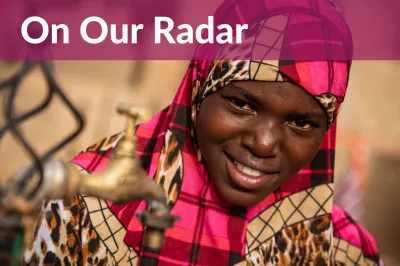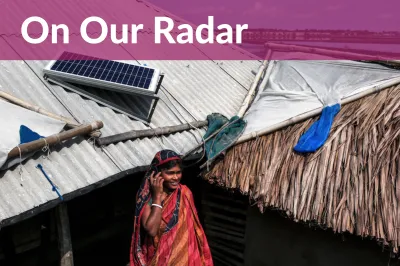Carolina Trivelli, Researcher Instituto de Estudios Peruanos

Carolina, thank you for participating in the FinEquity Spotlight series. Please tell us a bit about Instituto de Estudios Peruanos (IEP) and how the work you do with poor women in Peru.
We are a social sciences think-tank dedicated to gaining a better understanding of the social, economic, and political processes that affect people's well-being and opportunities for development. We work to ensure that this knowledge informs the design and implementation of public and private policies and interventions.
Spurred by a desire to ensure development opportunities for vulnerable groups, about 15 years ago we began researching the potential of financial services to serve as instruments for social and economic inclusion. This led us to work on issues related to financial inclusion, and we chose to do this with a clearly excluded group: low-income rural women of indigenous descent. We learned a lot from this experience and soon began working on proposals for linking financial inclusion to cash transfer programs — mainly targeting women — in various countries in the Latin America and Caribbean (LAC) region.
Why did you decide to work in this field?
I began my career doing research on agricultural credit, and found that women were rarely granted credit and were not present in any discussion about it. But when interviewing women in rural areas they did use (informal) credit, had complex financial relations, and used several services. This led me to want to focus my career on financial inclusion for women.
At IEP our motivation is to demonstrate that excluded groups can take advantage of access to and use of financial services to overcome exclusions. Financial inclusion is a useful tool for everyone, but especially for those who face greater constraints. In the case of women, financial inclusion also helps them achieve autonomy, which is key for closing existing gender gaps.
What are currently your top priorities in your work on women’s financial inclusion?
We currently have three urgent challenges:
- First, to generate recommendations that practitioners can implement to reduce the barriers women face in gaining access to and using quality financial services.
- Second, to keep the issue on the agenda and go beyond the obvious problems (lack of guarantees, limited financial capabilities, etc.) in order to include important issues such as the need to make visible the unconscious biases that affect women's options, change regulations and rules, etc.
- Third, to improve the design and operation of financial products and services so that they truly leverage economic inclusion for women (increase available products and services, ensure that products address the needs of women-led enterprises, create savings products adapted to their needs, etc.).
What is the impact of COVID on your work?
For a researcher, COVID-19 limits opportunities for gathering information in the field, as we did before. All is now done by telephone or virtual means, and it is necessary to adapt, but there is always the fear of not reflecting the situation of those who are most remote, most excluded. At the same time, however, the current crisis has allowed us to raise awareness of the importance of financial inclusion for protecting and including women, so they have more opportunities to recover their livelihoods. We are also able to highlight women’s financial inclusion as a tool for resilience. As a result, financial inclusion is now seen as essential by governments, economic actors, and society.
Do you have a “success story” you’d like to share? (An occasion where you felt that you or your organization was making a real impact in the lives of women in developing countries?)
The sustained work, from research and technical assistance to conditional cash transfer programs, ensured that all CCT recipients had a bank account, and the majority had a debit card and a minimum level of financial education. It seems like a small accomplishment, but thanks to that, during the COVID-19 crisis, it was these women, the poorest in Peru, who were best prepared to receive government assistance, and it was they who showed others in their communities how to receive a bank transfer. Thanks to that, they were protected.
You have been instrumental in the development of FinEquityALC. How did this come about?
FinEquity is a relevant and useful community for those of us who work on issues of gender and financial inclusion. However, many colleagues in LAC, especially practitioners or public servants were unable to access it because of language or because it was too global and sometimes removed from the problems of the region. For that reason, we had the idea that in Latin America and the (Spanish-speaking) Caribbean, we could benefit from having a Spanish-language space for replicating FinEquity's work. So far we are doing really well; for example, our webinars tend to attract large audiences (over 200 on average) and we have many ideas for growing our work in the future – including our #FinEquity2020 FinEquityALC event, which I hope all Spanish speakers will join!
What do you think is unique about the situation of women's financial inclusion in LAC?
Latin America and the Caribbean have not managed to close the gender gaps in financial inclusion; in fact, the gap has increased in recent years in some countries. At the same time, however, there are countries in the region where the environment is conducive to large-scale processes of financial inclusion. We cannot sideline women from these opportunities. There are structural and cultural issues that make the process difficult for women, but there are also enormous opportunities, millions of women entrepreneurs, a growing role for women in various areas (political, cultural, labor, etc.), and we must take advantage of this context. If Latin America and the Caribbean has a good environment for financial inclusion, we must ensure that this environment creates opportunities for women.
Is there anything you’d like to add?
FinEquityALC still has considerable room to grow and become more firmly established, to be an interesting space for those who are not yet completely convinced of the importance of achieving transformative processes for women through their financial inclusion. I’d also like to see FinEquityALC offer more opportunities for exchanging ideas about women’s financial inclusion in the LAC region and to integrate our work with the global FinEquity community. In that sense, we still have much to do!


